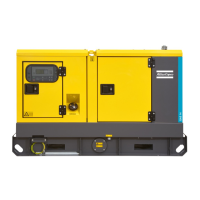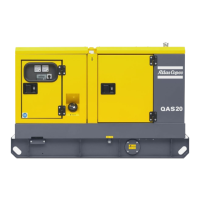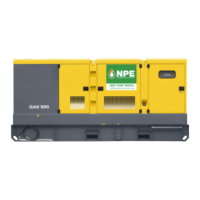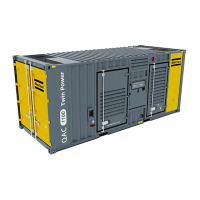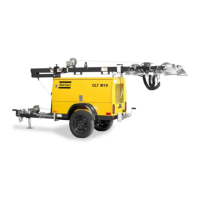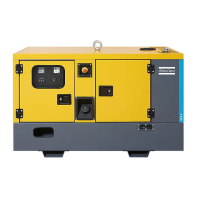QAS28 Yd(S), QAS28 YdS IT
14
&
211(&7,1*
7+(
*(1(5$725
3UHFDXWLRQVIRUQRQOLQHDUDQGVHQVLWLYHORDGV
The most common non-linear, 3-phase loads are thyristor/rectifier-
controlled loads, such as convertors supplying voltage to variable
speed motors, uninterruptable power supplies and Telecom sup-
plies. Gas-discharge lighting arranged in single-phase circuits gen-
erate high 3rd harmonics and risk for excessive neutral current.
Loads most sensitive to voltage distortion include incandescent
lamps, discharge lamps, computers, X-ray equipment, audio ampli-
fiers and elevators.
Consult Atlas Copco for measures against the adverse influence of
non-linear loads.
4XDOLW\ PLQLPXP VHFWLRQ DQG PD[LPXP OHQJWK
RIFDEOHV
The cable connected to the terminal board of the generator must be
selected in accordance with local legislation. The type of cable, its
rated voltage and current carrying capacity are determined by in-
stallation conditions, stress and ambient temperature. For flexible
wiring, rubber-sheathed, flexible core conductors of the type
H07 RN-F (Cenelec HD.22) or better must be used.
The following table indicates the maximum allowable 3-phase cur-
rents (in A), in an ambient temperature of 40 °C, for cable types
(multiple and single core PVC insulated conductors and H07 RN-F
multiple core conductors) and wire sections as listed, in accordance
with VDE 0298 installation method C3. Local regulations remain
applicable if they are stricter than those proposed below.
The lowest acceptable wire section and the corresponding maxi-
mum cable or conductor length for multiple core cable or H07 RN-
F, at rated current (36 A), for a voltage drop e lower than 5 % and
at a power factor of 0.80, are respectively 6 mm
2
and 120 m. In case
electric motors must be started, oversizing the cable is advisable.
The voltage drop across a cable can be determined as follows:
e = Voltage drop (V)
I = Rated current (A)
L = Length of conductors (m)
R = Resistance (Ω/km to VDE 0102)
X= Reactance (Ω/km to VDE 0102)
&RQQHFWLQJWKHORDG
Site distribution panel
If outlet sockets are required, they must be mounted on a site distri-
bution panel supplied from the terminal board of the generator and
in compliance with local regulations for power installations on
building sites.
Protection
– Check whether frequency, voltage and current comply with the rat-
ings of the generator.
– Provide for the load cable, without excessive length, and lay it out
in a safe way without forming coils.
QAS28 Yd(S)
– Open the door of the control and indicator panel and the transparent
door in front of the terminal board X1.
– Provide the wire ends with cable lugs suited for the cable terminals.
– Loosen the cable clamp and push the wire ends of the load cable
through the orifice and clamp.
– Connect the wires to the proper terminals (L1, L2, L3, N and PE) of
X1 and tighten the bolts securely.
– Tighten the cable clamp.
– Close the transparent door in front of X1.
QAS28 YdS IT
– Fit the cable plug into the corresponding socket X1, X2 or X3.
Non-linear loads draw currents with high contents
in harmonics, causing distortion in the wave form of
the voltage generated by the alternator.
Wire section (mm²) 2,5 4 6 10 16 25 35 50 70 95
Max. current (A)
Multiple core 22 30 38 53 71 94 114 138 176 212
Single core 25 33 42 57 76 101 123 155 191 228
H07 RN-F 21 28 36 50 67 88 110 138 170 205
For safety reasons, it is necessary to provide an iso-
lating switch or circuit breaker in each load circuit.
Local legislation may impose the use of isolating
devices which can be locked.
e
3IL R ϕcos⋅ X ϕsin⋅+()⋅⋅ ⋅
1000
------------------------------------------------------------------------------
=

